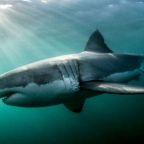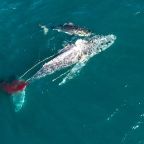I am often asked how I got into research on great white sharks, and how students can also break into this field. I don’t know if my story is applicable to many, but in this interview with Otago Universities ‘Critic’ magazine. I spell out my journey to becoming a great white shark biologist. The original interview can be viewed here: original interview
Yeah. And I asked her whether she could help me get across, and apartheid had just finished in South Africa a few years before that, so she got hold of the university and they accepted me across so I went over there.My first year I was in Pretoria, which is land-locked and it was incredible to work with all the lions, elephants, and all this really big, charismatic African game, but I realised then how much I missed the ocean. And what happened in 1998, there was a massive spate of Great White Shark attacks in South Africa and a lot of people were blaming this new activity, which was White Shark cage diving. So the government got involved and put a call out for research to be conducted to see whether the cage diving was in fact –Cage diving, as in a touristy sort of thing?
Yeah, shark tourism. So basically, I saw that up on my department wall and thought, “Hey, that’s for me. I get back to the ocean and I get to study the Great White Shark.” Because, as a zoologist, that’s your dream. So I applied for it, and basically I had to go and live on an island for a year. When a lot of people realised that was one of the requirements – this was an island that was one kilometre long by 200 metres wide – they pulled out of the running, so I think I was the only candidate left. I got it and that sort of started me off.
So when you say that you were missing the ocean, where did that come from? Did you always have an eye to marine biology when you were studying zoology?
Definitely. I was always moving towards marine biology. I remember in the Uni Col yearbook – my first year [at Otago] – you had to put down your dream job and it was to study goldfish or something crazy like that. But I grew up in Mount Maunganui and stuff and you just grew up on the beach and, you know: you row; you play in your nippers; you surf – and you’re doing everything and you don’t actually realise at the time how intricately aligned with the ocean you become and what impact it has on your childhood. You know, how many Kiwis surf, row, sail, and everything – it’s just really a part of our culture. And I think when New Zealanders are moved away from the ocean that’s when it really becomes apparent just how close we are to it.
Interesting. And so you obviously did a lot of recreational activities on water – were you into fishing and all that sort of stuff?
So then in terms of the opportunity that presented itself to you in South Africa, do you think it’s important for New Zealanders to go abroad, to look for those opportunities? So if you were a marine biologist in New Zealand, do you have the same level of opportunities as you’d have in South Africa or elsewhere?
I think South Africa is an incredibly special and unique place in terms of wildlife. I don’t think anywhere in the world, whether it’s the marine or terrestrial wildlife, has such a diversity, particularly of big, charismatic animals. Literally, where I live in South Africa I can drive 15 kilometres and I can see lions, elephants, hippos, Great White Sharks, southern right whales, dolphins, anything, You can not actually picture or imagine how accessible those big, charismatic animals are. So if you are interested in that type of work and that type of research and those animals then I think, unfortunately, New Zealand does come second. But in saying that, I do think that New Zealand does have its own very unique wildlife – and incredible diversity as well. It’s possibly not as big and charismatic [as South Africa’s], with New Zealand being a small island, but there are definitely opportunities.I think the recent realisation of the big Great White Shark populations down around Stewart Island and off Chatham Islands, there’s a great opportunity for shark biologists. In terms of shark research and shark biology, I think it wasn’t popular for many years in New Zealand because nobody really cared about sharks; it’s only been the last five or ten years that it’s really started to get a foothold here in New Zealand. There are some really exciting biologists that are coming up through the grade here. And I think there’s still a lot of scope for it, for more people to get involved.
And that population off Stewart Island – is it a migratory population? Are they only in our waters at a certain time?
I know there’s been some satellite tracking going on there and – I don’t know about the seasonality of it – but it’s definitely a migratory species and it seems to move from that Stewart Island area up to either the North of New Zealand or even across to Australia on a yearly basis, migrating back and forth, which is pretty cool. But I don’t know a lot about it.
Yeah, it’s interesting because you don’t hear too much about the Great Whites in New Zealand. And so, why do you love the Great White so much?
Goodness. If you could take every aspect of a huge, exciting, charismatic animal and stick it into one creature it would be the Great White Shark. You’ve got an evolutionary history that is incredible – not only of the Great White, where you’re talking of 420 million years that they’ve evolved separately. You’ve got, along with the Orca, the ocean’s greatest predator. And what was also really intriguing for me from a scientific perspective was that everyone was focused on one aspect of their life history – that they can bite humans. When I started researching them and started going through the literature I realised very little else was known about them. So you’re a young biologist starting out and you’ve got this huge, great charismatic species that suddenly you’ve discovered this really easily studied population of them off South Africa and you realise that nobody’s done much, or hardly anything, on them, and you’ve got this smorgasbord of research questions that you’ve got to answer. It’s the dream of any biologist.
I guess that’s a rare opportunity if you are scientifically minded. Because there’s often that misconception that all the big discoveries have been made, so it must be exciting to find something like that!
Well, you know, that was one of the frustrations when I went to Pretoria was I thought I was going to have, you know, new questions about elephants, or hippos. But these terrestrial animals have been studied for fifty – one hundred years in South Africa and there’s very advanced science about them. And when I got down to the Great White it was just an open book – a blank book – that I could just delve into and find what interests me and just go for it.
Yeah I can certainly see the excitement in that, definitely. And so what are some unique challenges to studying them, then? I read somewhere that they’re quite difficult to track. Didn’t you first track the migratory pattern of the Great Whites?
Yeah, I think your main challenge to studying a Great White is the environment. There’s that natural barrier between terrestrial and marine life. As a human you have to breathe air, so to study any type of behaviour in fish, somehow you have to be able to study them under water. What happened was a couple of years after I started, all of this technology that was initially developed for the Navy and for tracking submarines and enemies, started being moved across to be able to be applied to animals. So you had acoustic tags, all these satellite tags coming out, everything like that. When I scrounged up all the money and managed to get all these tags, suddenly you were able to utilise this very sophisticated technology for the first time to really start studying these sharks, particularly their movements and migrations. That was the biggest challenge, because it’s such a new science. But it’s also been the most rewarding because, you know, we’ve been able to document the greatest migrations of sharks anywhere in the world from our work in South Africa.
So back to people and their misperceptions of sharks – do you find that you hate media portrayal of shark attacks and such? That’s it’s really sensationalised and, you know, do you hate Jaws?
You know, it could be improved but I understand it. I understand that the media produces what the reader or viewer wants to hear. And shark attacks are always going to be a story that captures the public’s imagination. And the media is a slave to that and it’s going to respond to that. I’ve been asked a number of times why I take on those kinds of jobs and positions in the media that do potentially portray the sharks in possibly a negative light, or a light where their man-eater aspects are played up a lot. And it’s a hard one to answer, but the reality is, if me as a semi-educated scientist who has a mature approach to it, doesn’t take in those positions then someone else is going to and it’s more likely that person will have no problem portraying the White Shark in any manner that’s not accurate. So at least being able to step in and take that and hopefully guide and educate and inform the media so that there’s still someone selling the magazine or the documentary, but there’s a little bit of a deeper insight.
And so by making documentaries as you do, do you feel that you’re slowly changing that media landscape?
Definitely. I’ve worked on some wonderful documentaries that have really started portraying the diversity of behaviours or the intrigue of the Great White as a species, rather than playing off the interest of the Great White as a man-eater. And when I’ve gone about these and you see how particularly kids and stuff start understanding and interacting and talking about Great Whites as more than just a man-eater, it’s very rewarding and you know by taking that place in the mass media and making those documentaries and feeding it out to millions of people, that you’re actually doing something good.
I always get drawn back to sharks because I know, of all the marine species in the water at the moment; the sharks are the ones of most interest. You know, in the ‘80s and ‘90s, the demand for shark product and in particular shark fins, skyrocketed. The demand sort of outstripped the science known, the resource management known, there was nothing that could match the demand for this fin soup. So suddenly the sharks were being all fished out and there was no management plan so there were no conservation efforts; there was no research. So it is really important that all the scientists involved in shark research really buckle down and start getting this data because if it’s not there the demand won’t be stopped and we won’t have sharks.












